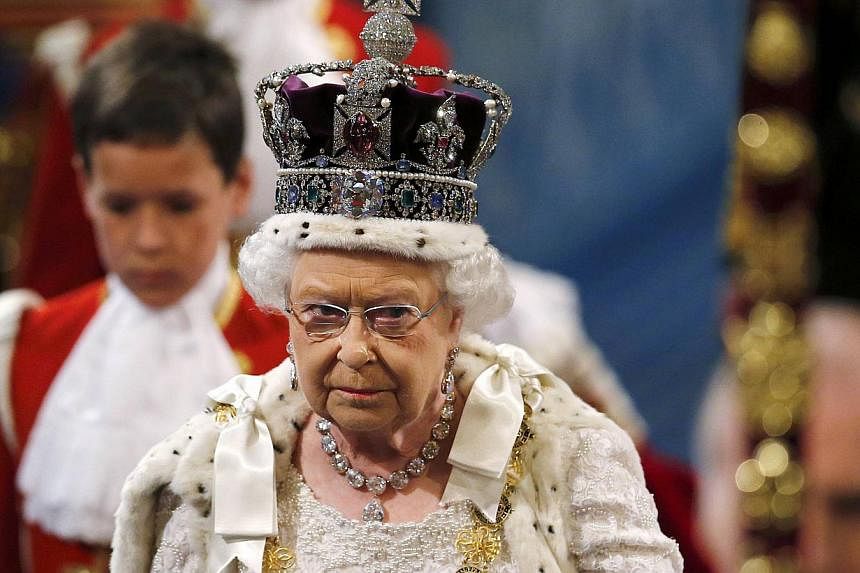LONDON (AFP) - British Prime Minister David Cameron's government confirmed it will hold a referendum on whether Britain should leave the EU Wednesday in a policy speech read by Queen Elizabeth II on Westminster's grandest day.
The 89-year-old monarch also set the stage for further budget austerity under Cameron's newly elected centre-right government but promised measures for "working people" such as more free childcare.
Wearing a crown and full ceremonial dress, the queen said Britain would "pursue reform of the European Union for the benefit of all member states".
She added: "Alongside this, early legislation will be introduced to provide for an in-out referendum on membership of the European Union by the end of 2017."
The Queen's Speech also featured plans to hand more powers to Scotland and prohibit raising three main taxes for the next five years, despite planned cuts to reduce Britain's deficit including welfare savings of £12 billion (S$25 billion ).
The white-clad monarch, delivering the 62nd Queen's Speech of her reign, arrived at parliament in a gold and black carriage accompanied by dozens of horsemen to the sound of the national anthem, "God Save The Queen".
In a bizarre tradition dating back to times of hostility between parliament and monarchy, an MP was "held hostage" at Buckingham Palace until she returned safely.
Thousands of people were expected to hold anti-austerity protest in central London after the speech.
"We've suffered austerity for too long. It created the longest fall in living standards since records began for the majority while the thousand richest doubled their wealth," said Sam Fairbairn, one of the organisers.
The EU referendum bill, which is due to be published on Thursday, is expected to keep open the prospect of a vote next year - which Cameron has not ruled out - but not include a precise date for the ballot.
Parliament could start debating the bill as early as June, media reported.
Cameron, who addresses the House of Commons after the Queen's Speech, embarks on a whistle-stop tour of European capitals including Paris, Warsaw and Berlin on Thursday and Friday as he pushes for reforms which he says are necessary before the referendum.
Some of Cameron's goals include controlling migration by making it harder for EU migrants to claim state benefits in Britain and opting out of the commitment to "ever closer union".
The speech also featured legislation to secure a "strong and lasting constitutional settlement" which will hand new powers to Scotland after it voted against independence in a referendum last year.
In the speech, the queen promised "wide-ranging powers" for Scotland as well as Wales, another constituent nation of Britain.
But Nicola Sturgeon's pro-independence Scottish National Party (SNP), which became the third largest group in the Commons following the election, wants the government to go further.
Other measures in the Queen's Speech included plans to to pass a law which would ban it from increasing income tax, VAT (a form of sales tax) and national insurance (contributions towards state benefits) for the next five years.
The government is also introducing new powers to ban "extremist organisations" seen as responsible for radicalisation and a communications bill, dubbed a "snoopers' charter" by critics, which could oblige mobile phone companies and Internet service providers to hand individuals' browsing data to security services.
The Conservatives have only a narrow majority and could struggle to pass controversial legislation if they face rebellions from within their own ranks.
Cameron has reportedly delayed a plan to scrap some European human rights laws, which had been expected in the Queen's Speech, due to opposition from within his own party.

